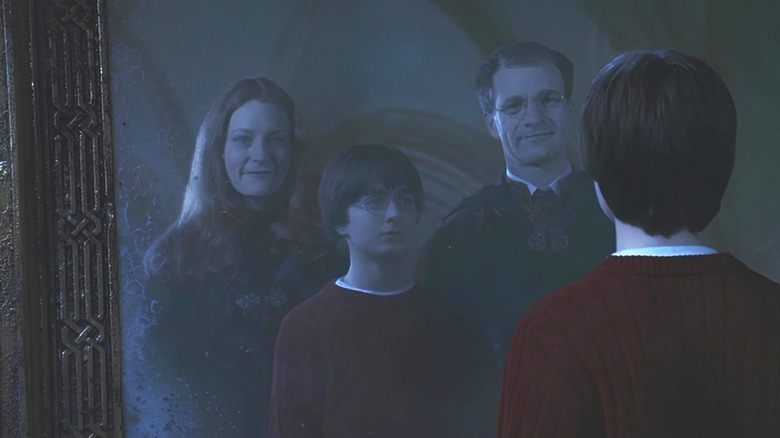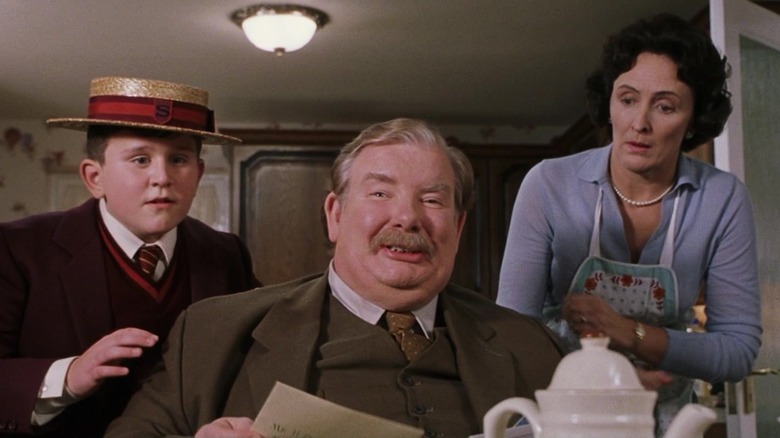Are Harry Potter's Grandparents Dead Or Alive? Here's What Really Happened To Them
Harry Potter (Daniel Radcliffe) never knew his grandparents. Casual fans of J.K. Rowling's work might blame Albus Dumbledore (Richard Harris, Michael Gambon) for that painful absence, considering how he dumps the Boy Who Lived on the Dursley's doorstep in "Harry Potter and the Sorcerer's Stone." But it isn't the old wizard's meddling that prevents a touching family reunion because Harry's grandparents — all four of them — died before he was even born. In the first book, as well as the first film, Dumbledore tells Minerva McGonagall (Maggie Smith) that the Dursleys are the only family Harry has left. Beyond this, though, Harry's grandparents are hardly ever mentioned.
So what happened to them exactly? Was it tragedy or time that befell the Evanses and Potters? Well, it's a little bit of both and most likely all at once. Fleamont and Euphemia Potter, Harry's paternal grandparents, died of dragon pox shortly before he was born. Rowling provides no exact date but she does mention in her extended writings that they were alive long enough to see their son James (Adrian Rawlins) graduate Hogwarts and marry Lily Evans (Geraldine Somerville), which means that the older Potter couple dies at some point between 1978 and 1980.
Regarding Mr. and Mrs. Evans, Harry's maternal grandparents, the details are few and far between. Information is so sparse that the pair don't even have first names. During a 2005 interview with Melissa Anelli and Emerson Spartz, Rowling simply said that they died typical Muggle deaths. Her statement is so vague that speculating a more specific cause of death would be pointless. Maybe someday the author will flesh out their stories.
Blood magic (and bad luck) binds Harry to the Dursleys
Even if Harry's grandparents were alive when the story began in earnest, only Mr. and Mrs. Evans would have fallen within the realm of Dumbledore's spellwork. The reason that Harry stays with the Dursleys, rather than with literally anyone else, is because Petunia Dursley (Fiona Shaw) is related to him by his mother's blood. In "Harry Potter and the Order of the Phoenix," Dumbledore explains to Harry how he is protected under their roof by an ancient magic that Lily triggered when she sacrificed herself to protect him from Lord Voldemort (Ralph Fiennes).
"While you can still call home the place where your mother's blood dwells, there you cannot be touched or harmed by Voldemort. He shed her blood, but it lives on in you and her sister. Her blood became your refuge," Dumbledore says. "You need return there only once a year, but as long as you can still call it home, there he cannot hurt you. Your aunt knows this ... She knows that allowing you houseroom may well have kept you alive for the past fifteen years."
Dumbledore's spell, the death of Harry's grandparents, and the bald-faced villainy of the Dursleys make up J.K. Rowling's one-two-three-hit combo that ensures her protagonist is isolated and sympathetic, even if it does gloss over reality. It is statistically improbable that every other person who shares some blood connection to Lily is dead, and even more so that everyone related to James is dead, too. However, Muggles didn't have social media in the 1990s to keep in touch with their loved ones, and the magical community tends to obey Dumbledore's every whim. As such, Harry's extended family being dead is a tragically cleaner way to justify the narrative.

